 Fell Terrier is originated from United Kingdom but Yorkillon is originated from United States. Fell Terrier may grow 15 cm / 6 inches higher than Yorkillon. Both Fell Terrier and Yorkillon are having almost same weight. Both Fell Terrier and Yorkillon has same life span. Both Fell Terrier and Yorkillon has same litter size. Both Fell Terrier and Yorkillon requires Moderate Maintenance.
Fell Terrier is originated from United Kingdom but Yorkillon is originated from United States. Fell Terrier may grow 15 cm / 6 inches higher than Yorkillon. Both Fell Terrier and Yorkillon are having almost same weight. Both Fell Terrier and Yorkillon has same life span. Both Fell Terrier and Yorkillon has same litter size. Both Fell Terrier and Yorkillon requires Moderate Maintenance.
Basic Information
undefined
United Kingdom
United States
Life Span:
11 - 14 Years
12 - 14 Years
Other Names:
Black Fell, Patterdale Terrier, Red Fell
Papa-ShirePapa-Shire • Papiyork • Yorkie Pap Papillon-Yorkshire Terrier Mix, Papillon-Yorkie Mix,
Colors Available:
black and tan, White, chocolate, black, red, bronze
White, brown and white, light brown/golden, dark brown/chocolate, black and brown, black
Coat:
Short or longer - coarse
Straight, medium, fine fine, soft coat
Shedding:
Moderate
Moderate
Temperament:
Affectionate, Alert, Cheerful, Courageous, Curious, Energetic, Friendly, Gentle, Independent, Intelligent, Lively, Loving, Loyal, Outgoing, Playful, Protective, Responsive, Social, Stubborn, Territorial
Alert, Energetic, Friendly, Loving, Loyal, Playful
Grooming:
Moderate Maintenance
Moderate Maintenance
Trainability:
Moderate
Easy
New Owners Friendly:
Yes
Yes
History
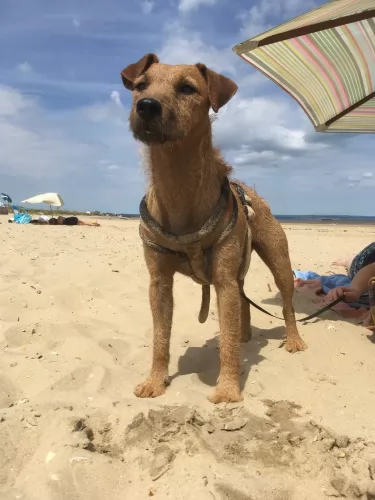 Fell terriers, known by other names such as Lakeland-, Patterdale-, Red Fell or Black Fell Terrier are small working terriers, hailing from the fell or hilly country of northern England.
Fell terriers, known by other names such as Lakeland-, Patterdale-, Red Fell or Black Fell Terrier are small working terriers, hailing from the fell or hilly country of northern England.
Several breeds have been developed from the Fell terrier, of which the Patterdale Terrier, Lakeland are some as well as other locally developed breeds. All these particular breeds are sometimes referred to as the Fell Terrier, and in fact the National Terriers Club LLC has published a Fell Terrier standard.
It is also believed that the long legged Fell Terriers may have descended from an old type of terrier referred to as the rough-coated Black and Tan. The Black and Tan Terrier is now extinct but was drawn into The Kennel Club as the Welsh Terrier.
The Yorkillon is a bighearted cross between the Yorkshire Terrier and the Papillon. They are small dogs with huge attitudes and big ears. They are known to be sassy and get into trouble. They are playful, affectionate and intelligent. They were initially developed in the US sometime about 20-30 years ago.
Not recognized by the American Kennel Club as they are considered designer dogs or mixed breeds
Description
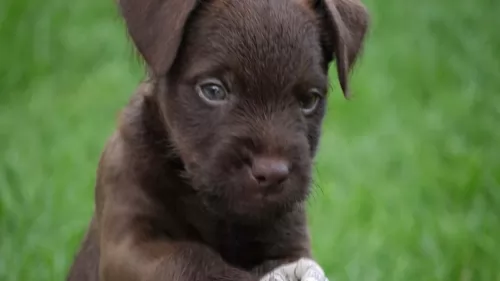 Small and feisty, the Fell Terrier is a working dog used for hunting purposes. He stands at roughly 31cm to 38cm in height and ways between 6 to 9kg.
Small and feisty, the Fell Terrier is a working dog used for hunting purposes. He stands at roughly 31cm to 38cm in height and ways between 6 to 9kg.
The dogs were sought after for their hunting skills as being the small dog they were, and with their narrow chests, they were able to move around in small, narrow underground tunnels.
The Fell has long legs, and his coat is shortish but with a rough texture to it. The coat is found in different colors such as white, black and tan, chocolate, red, black and bronze. The ears are medium length and floppy while the tail of the dog is traditionally docked, but these days the tail is often left long, and then he becomes less distinctive.
Temperament:
Used to having hunted in packs, the Fell Terrier has always been used to getting along well with other dogs. He makes a fantastic family pet and will get on well with children who have been been taught to respect animals. He is an independent, strong-willed dog and will certainly need socialization and training to turn him into an obedient dog.
He is energetic, fearless, strong-willed, determined and always ready for a game or some form of action.
The Yorkillon is a small dog that can look like a Yorkie or a Papillon but most due have large ears like the Papillon. Both parent breeds have long hair and short legs. There is still a lot of first generation breeding, but most are now products of multigenerational breeding. This means that every puppy can look different and no two are likely to look the same.
Characteristics
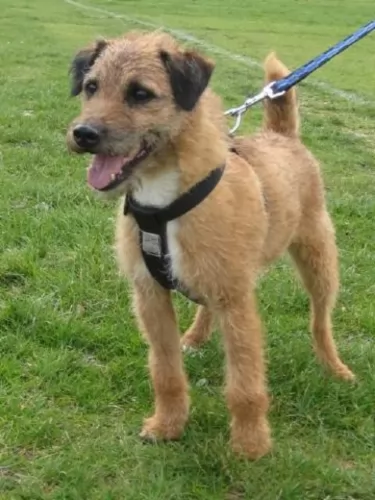 The Fell Terrier still has dreams of the hunt in him and with his strong prey instincts, he isn’t really suited to city living, but will fit ideally into life in the country.
The Fell Terrier still has dreams of the hunt in him and with his strong prey instincts, he isn’t really suited to city living, but will fit ideally into life in the country.
He is a high spirited, working dog with an endless amount of energy. He bonds closely with his human family, and for all his robust, larger-than-life attitude and boldness, when he is with his human family he can be gentle, calm and loving, just thriving on the love he receives.
Your Fell Terrier is just waiting to be your best friend and a never ending source of unconditional love.
1.Children friendliness yes but be careful the children do not hurt the small dogs. This is particularly true regarding the risk of tracheal collapse.
2.Special talents – loves to do tricks
3.Adaptability – can live anywhere in an apartment as well as a home, but he would prefer to have a fenced yard to run in.
4.Learning ability – extremely smart and very obedient
Health Problems
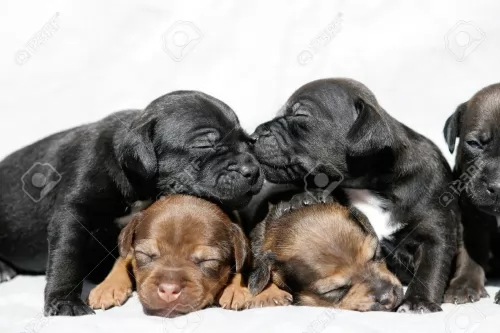 Caring for your Fell Terrier requires knowing what do do with him when he develops certain common dog illnesses. He is a robust dog and is not likely to get any serious illnesses, but still you want to know about some of the more common ones.
Caring for your Fell Terrier requires knowing what do do with him when he develops certain common dog illnesses. He is a robust dog and is not likely to get any serious illnesses, but still you want to know about some of the more common ones.
If you suspect an illness, get your pet to the vet who can provide you with a treatment plan for your dog.
Dental Disease:
Your Fell Terrier can easily fall prey to dental disease if you don't brush his teeth at least 2 or 3 times a week. Unfortunately bad teeth isn't just a case of losing a tooth or two, bad teeth can cause serious diseases such as kidney disease. Tarter build-up progresses to infection of the gums as well as roots of the teeth. So serious is dental disease that your dog can actually have his life shortened.
Obesity:
Your Fell Terrier is a small dog and obesity can easily creep up if you don't control your pet's diet. Obesity is a serious illness that can increase problems with the joints and digestion.
There are not a lot of hereditary health issues but there are some issues they can be prone to:
• Patellar Luxation – slipped knee caps can lead to lameness.
• Epilepsy – can be treated with medication.
• Diabetes – can be treated with medication
• Legg Calve Perthes Disease – blood disorder affecting hind leg bones.
• Heart defects
• Tracheal collapse
• Hip dysplasia – can cause lameness.
Caring The Pet
Exercise:
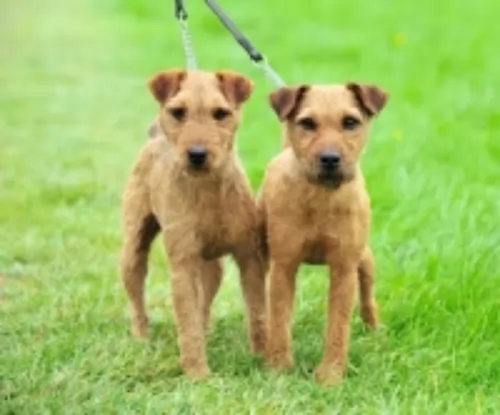 Your Fell Terrier is an active dog who won’t thrive if he is cooped up and ignored. He thrives on action and will need to be taken on walks with you and involved in all your games and sports, such as when you go jogging, swimming or cycling.
Your Fell Terrier is an active dog who won’t thrive if he is cooped up and ignored. He thrives on action and will need to be taken on walks with you and involved in all your games and sports, such as when you go jogging, swimming or cycling.
Diet:
Feed your Fell Terrier the best quality commercially manufactured foods if you opt to feed your pet this way. Include cooked brown rice, vegetables and chicken into his kibble from time to time and always ensure there is cool, fresh drinking water available to him.
Grooming:
It depends on whether your Fell Terrier has a short, smooth coat, or the longer-haired coarse coat. He will certainly need brushing twice a week and sometimes, with the longer coats, he may require professional trimming or stripping.
Always check nails, in and outside the ears and remember to brush his teeth with canine toothpaste and toothbrush twice a week at least.
1.Feeding the puppy Feed a high quality toy puppy food 3-4 meals per day a total of ¼ cup for the day.
2.Feeding the adult Feed a high quality toy puppy food 1-2 meals per day a total of ½ cup for the day.
3.Points for Good Health – No inherited issues.
4. Games and Exercises – These are high energy dogs as both parent breeds are such. They need to run, love having a fenced yard, 15-20 minute walks per day.
Comparison with other breeds
- Fell Terrier vs English Bulldog - Breed Comparison
- Fell Terrier vs German Shepherd - Breed Comparison
- Fell Terrier vs Golden Retriever - Breed Comparison
- Fell Terrier vs Labrador Retriever - Breed Comparison
- Fell Terrier vs West Highland White Terrier - Breed Comparison
- Fell Terrier vs French Bulldog - Breed Comparison
- Fell Terrier vs Beagle - Breed Comparison
- Fell Terrier vs Yorkshire Terrier - Breed Comparison
- Fell Terrier vs Poodle - Breed Comparison
- Fell Terrier vs Rottweiler - Breed Comparison
- Fell Terrier vs Boxer - Breed Comparison
- Fell Terrier vs English Pointer - Breed Comparison
- Fell Terrier vs Siberian Husky - Breed Comparison
- Fell Terrier vs Doberman Pinscher - Breed Comparison
- Fell Terrier vs American Bully - Breed Comparison
- Fell Terrier vs Abruzzenhund - Breed Comparison
- Fell Terrier vs Affenpinscher - Breed Comparison
- Fell Terrier vs Afghan Hound - Breed Comparison
- Fell Terrier vs Aidi - Breed Comparison
- Fell Terrier vs Airedale Terrier - Breed Comparison
- Fell Terrier vs Akbash Dog - Breed Comparison
- Fell Terrier vs Akita - Breed Comparison
- Fell Terrier vs Africanis - Breed Comparison
- Fell Terrier vs Askal - Breed Comparison
- Fell Terrier vs Atlas Terrier - Breed Comparison
- Yorkillon vs English Bulldog - Breed Comparison
- Yorkillon vs German Shepherd - Breed Comparison
- Yorkillon vs Golden Retriever - Breed Comparison
- Yorkillon vs Labrador Retriever - Breed Comparison
- Yorkillon vs West Highland White Terrier - Breed Comparison
- Yorkillon vs French Bulldog - Breed Comparison
- Yorkillon vs Beagle - Breed Comparison
- Yorkillon vs Yorkshire Terrier - Breed Comparison
- Yorkillon vs Poodle - Breed Comparison
- Yorkillon vs Rottweiler - Breed Comparison
- Yorkillon vs Boxer - Breed Comparison
- Yorkillon vs English Pointer - Breed Comparison
- Yorkillon vs Siberian Husky - Breed Comparison
- Yorkillon vs Doberman Pinscher - Breed Comparison
- Yorkillon vs American Bully - Breed Comparison
- Yorkillon vs Abruzzenhund - Breed Comparison
- Yorkillon vs Affenpinscher - Breed Comparison
- Yorkillon vs Afghan Hound - Breed Comparison
- Yorkillon vs Aidi - Breed Comparison
- Yorkillon vs Airedale Terrier - Breed Comparison
- Yorkillon vs Akbash Dog - Breed Comparison
- Yorkillon vs Akita - Breed Comparison
- Yorkillon vs Africanis - Breed Comparison
- Yorkillon vs Askal - Breed Comparison
- Yorkillon vs Atlas Terrier - Breed Comparison
 Petzlover
Petzlover Fell Terrier is originated from United Kingdom but Yorkillon is originated from United States. Fell Terrier may grow 15 cm / 6 inches higher than Yorkillon. Both Fell Terrier and Yorkillon are having almost same weight. Both Fell Terrier and Yorkillon has same life span. Both Fell Terrier and Yorkillon has same litter size. Both Fell Terrier and Yorkillon requires Moderate Maintenance.
Fell Terrier is originated from United Kingdom but Yorkillon is originated from United States. Fell Terrier may grow 15 cm / 6 inches higher than Yorkillon. Both Fell Terrier and Yorkillon are having almost same weight. Both Fell Terrier and Yorkillon has same life span. Both Fell Terrier and Yorkillon has same litter size. Both Fell Terrier and Yorkillon requires Moderate Maintenance.  Fell terriers, known by other names such as Lakeland-, Patterdale-, Red Fell or Black Fell Terrier are small working terriers, hailing from the fell or hilly country of northern England.
Fell terriers, known by other names such as Lakeland-, Patterdale-, Red Fell or Black Fell Terrier are small working terriers, hailing from the fell or hilly country of northern England. Small and feisty, the Fell Terrier is a working dog used for hunting purposes. He stands at roughly 31cm to 38cm in height and ways between 6 to 9kg.
Small and feisty, the Fell Terrier is a working dog used for hunting purposes. He stands at roughly 31cm to 38cm in height and ways between 6 to 9kg. The Fell Terrier still has dreams of the hunt in him and with his strong prey instincts, he isn’t really suited to city living, but will fit ideally into life in the country.
The Fell Terrier still has dreams of the hunt in him and with his strong prey instincts, he isn’t really suited to city living, but will fit ideally into life in the country. Caring for your Fell Terrier requires knowing what do do with him when he develops certain common dog illnesses. He is a robust dog and is not likely to get any serious illnesses, but still you want to know about some of the more common ones.
Caring for your Fell Terrier requires knowing what do do with him when he develops certain common dog illnesses. He is a robust dog and is not likely to get any serious illnesses, but still you want to know about some of the more common ones. Your Fell Terrier is an active dog who won’t thrive if he is cooped up and ignored. He thrives on action and will need to be taken on walks with you and involved in all your games and sports, such as when you go jogging, swimming or cycling.
Your Fell Terrier is an active dog who won’t thrive if he is cooped up and ignored. He thrives on action and will need to be taken on walks with you and involved in all your games and sports, such as when you go jogging, swimming or cycling.